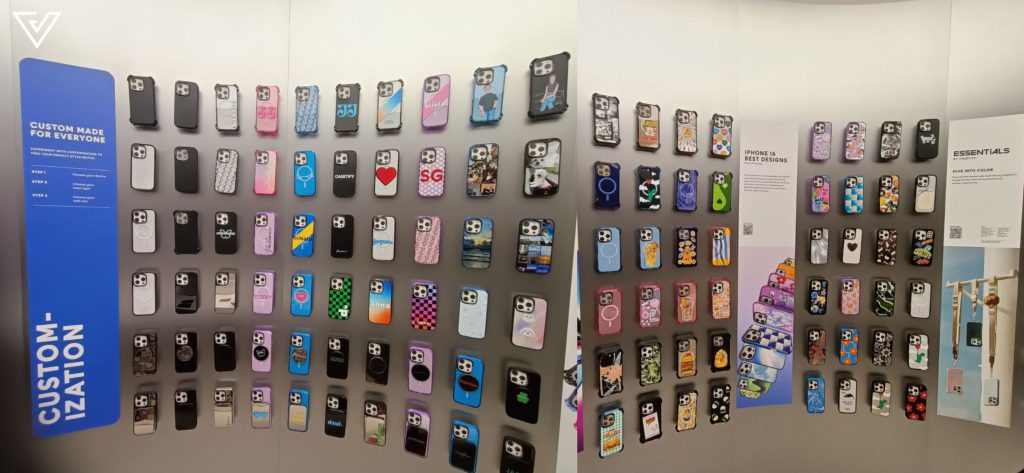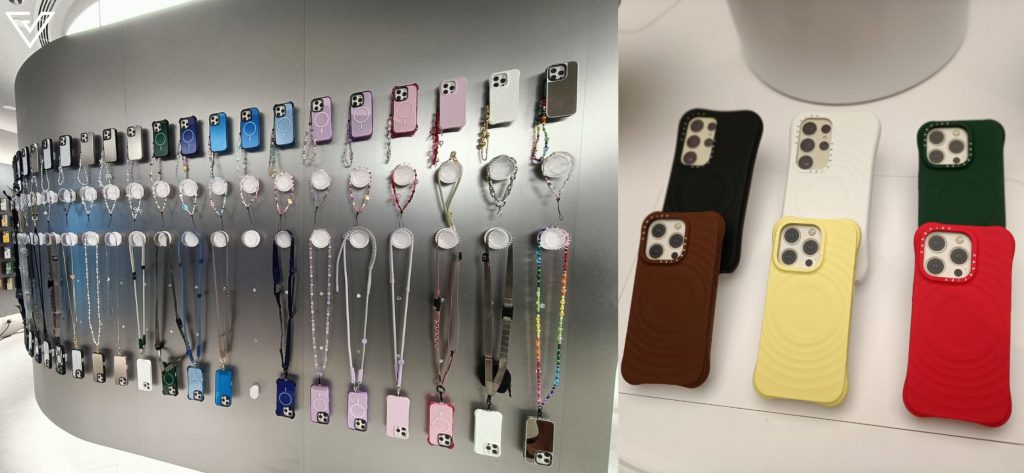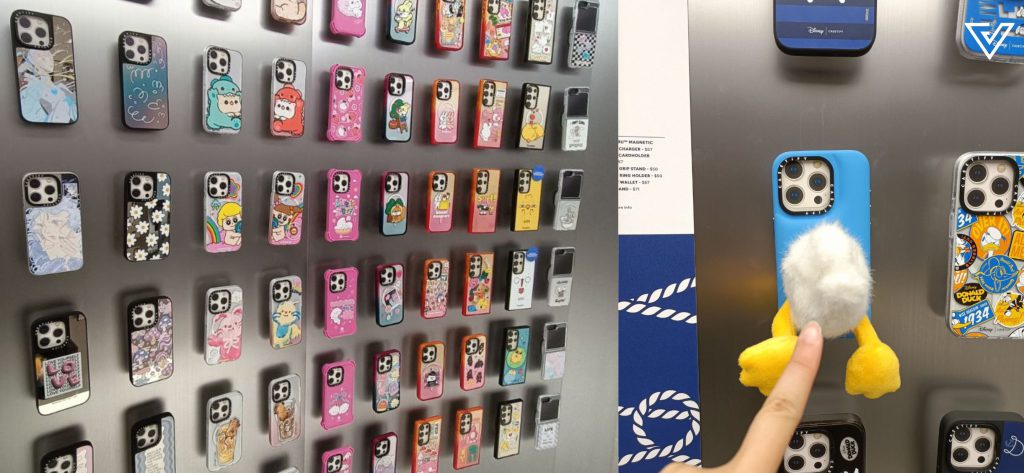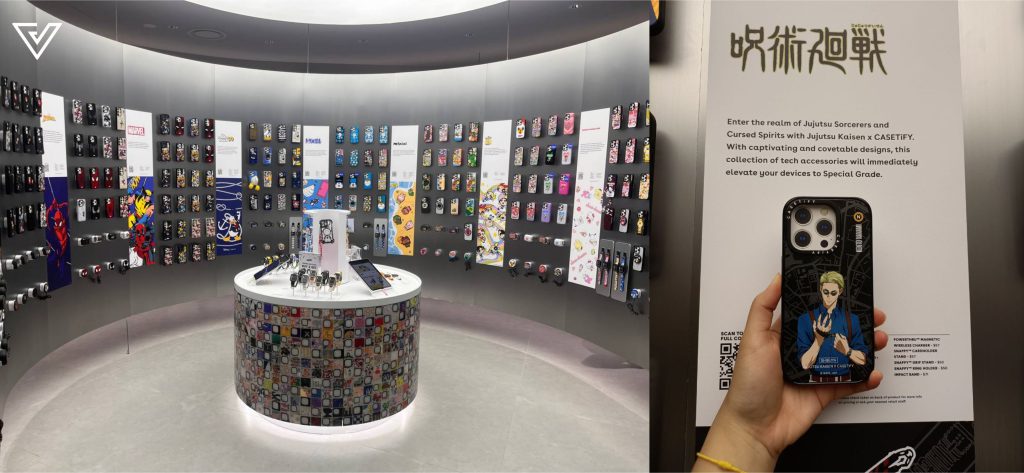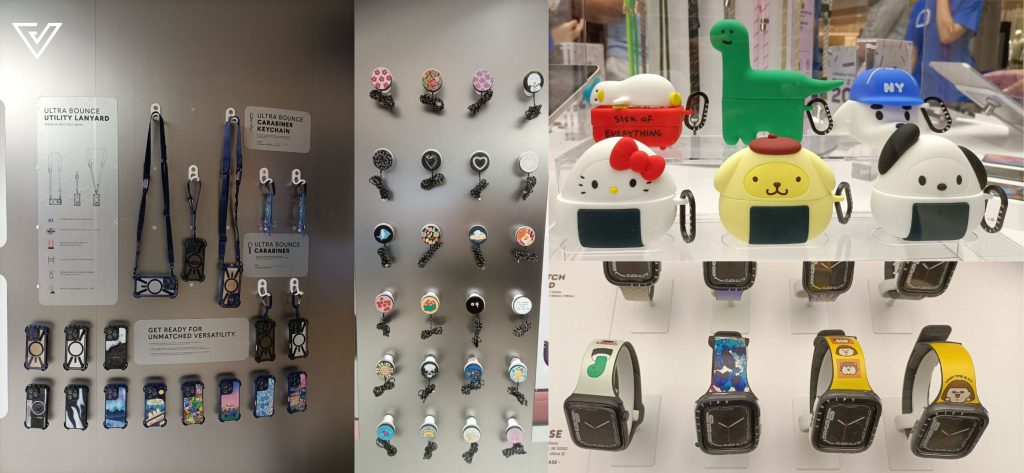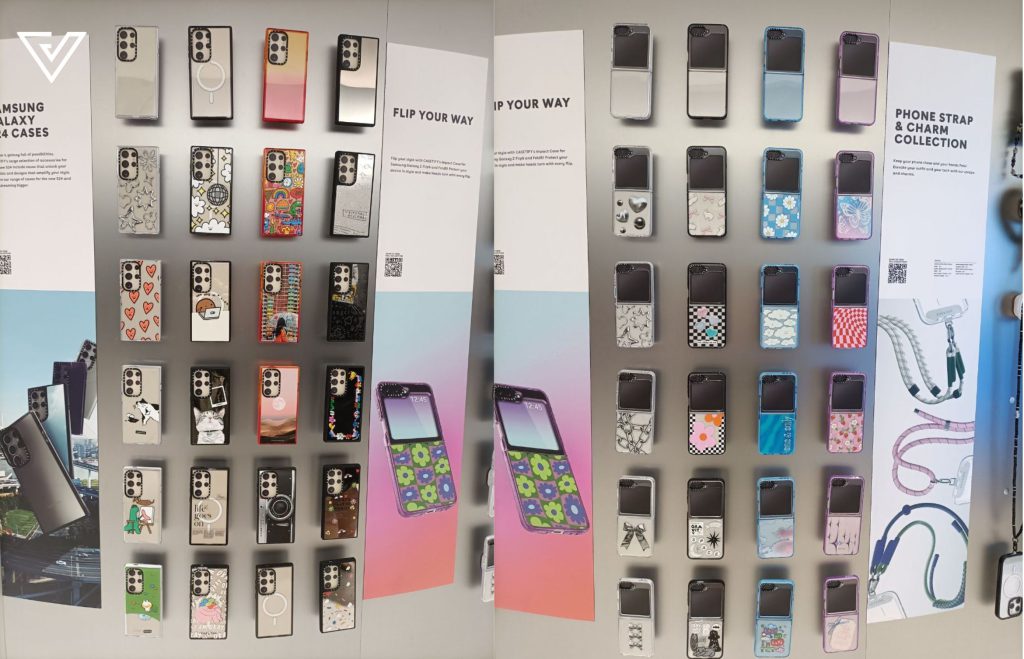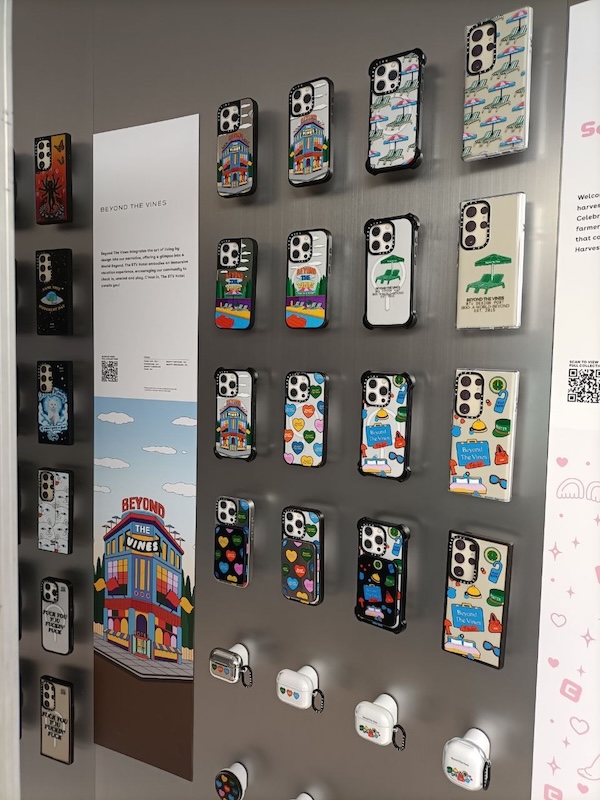Gigi Coffee is now halal-certified by JAKIM, hopes to inspire trust in Muslim consumers
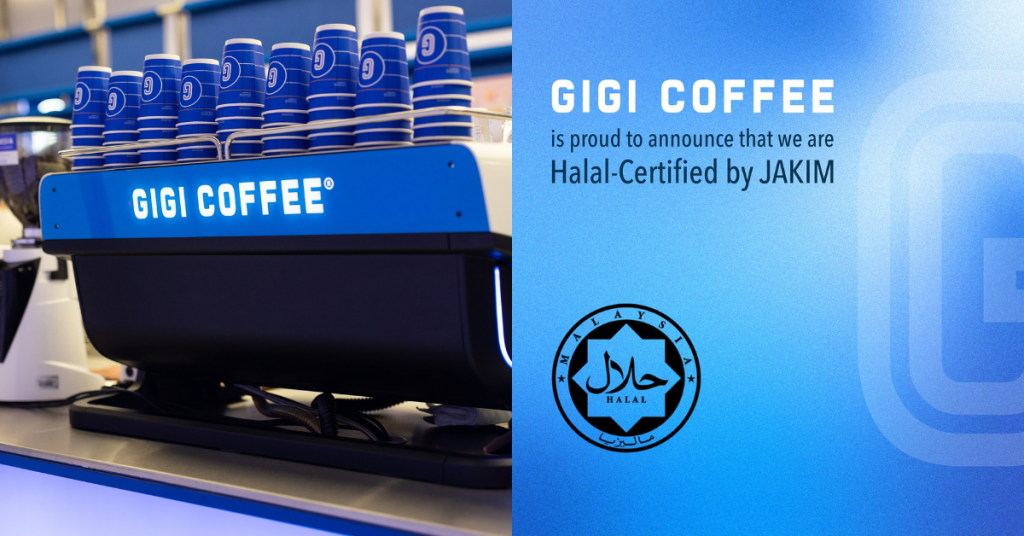
Gigi Coffee, a popular homegrown coffee chain is now halal certified by JAKIM.
That’s right, your morning (or evening) caffeine treat has gained JAKIM’s nod of approval. This comes after its outlets underwent a rigorous examination process to ensure that its food handling, preparation, and sourcing is up to halal guidelines.
For context, there is a long list of requirements before JAKIM provides an F&B establishment with a halal certification. And no, not all of them are related directly to the food or drinks being served.
Some requisites you might not be aware of include needing to have a strategic layout plan and a minimum number of Muslims employees (who are Malaysian citizens).

Gigi Coffee reassures customers that they are actively working to certify all the remaining ones, reinforcing its commitment to product quality for all customers.
Through this initiative, the brand aims to inspire confidence and trust amongst their Muslim customers. At the same time, this milestone exhibits the brand’s dedication to being inclusive and sensitive to Malaysia’s diverse society.
“We’re delighted to announce that we have officially received the halal certification, and with this achievement, it reflects our ongoing dedication to product quality and our goal of serving a broader customer base,” said Ts. Au Soon Yong, Gigi Coffee’s Group COO.
“We’re committed to maintaining the highest standards across our outlets, ensuring that Gigi Coffee offers halal-certified products and services. This will allow us to create an environment where everyone can enjoy our meals and beverages with full confidence in our adherence to strict product quality and regulatory standards.”
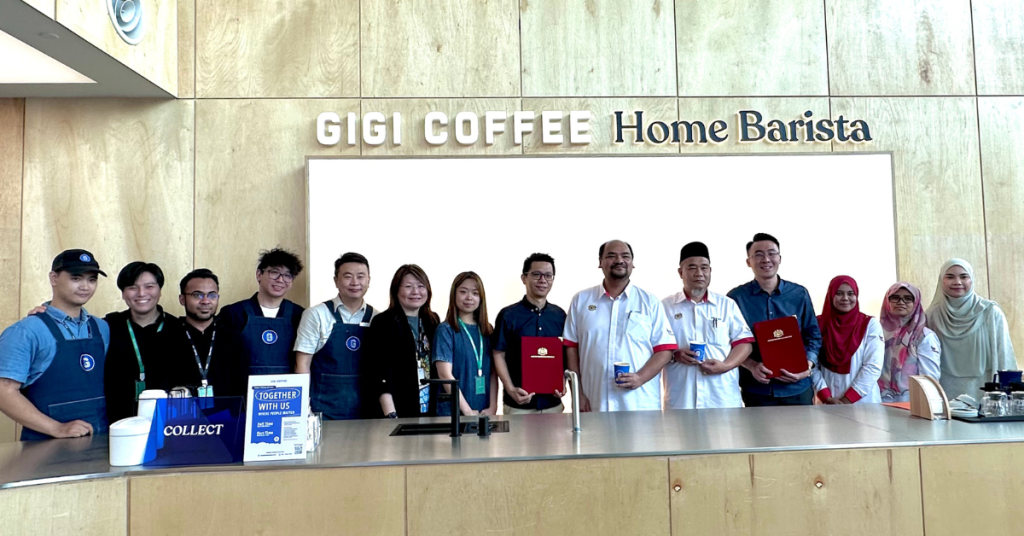
The coffee group also disclosed that this halal certification is part of its broader strategy in maintaining the highest standards “in all aspects of operations”. Understanding the importance of quality and inclusivity to customers, the brand wants this reflected in every cup of coffee Gigi Coffee serves.
Besides the halal certification, Gigi Coffee also shared that it has received official accreditation from the Ministry of Human Resources for its barista training programme. This is available under the National Dual Training System (SLDN), which aims to upskill the workforce through practical and theoretical training.
Specifically, the programme is meant for baristas to develop expertise in coffee-making alongside other skills, like customer service and workplace hygiene.
This initiative further reflects Gigi Coffee’s dedication to nurturing skilled professionals who are fully equipped to deliver customer service and product quality in line with the halal standards.
Also Read: 5 scenarios in which you would appreciate having the reliable ASUS Vivobook 16 for work
Featured Image Credit: Gigi Coffee
We visited CASETiFY’s 1st standalone studio in S’pore, and our jaws dropped. Here’s why.

This article has been updated to include CASETiFY’s comments from Vulcan Post’s enquiries.
CASETiFY, the brand known for its fashionable yet sturdy phone cases, has just opened its first standalone studio at the heart of Singapore last Saturday (September 28).
Located at ION Orchard, the studio is the largest outlet islandwide, with the brand aiming to offer an “immersive and unparalleled shopping experience” for customers in Singapore.
Vulcan Post received an exclusive invite to visit the brand-new outlet yesterday (October 3); here’s what you can expect if you drop by.
A look into the new store
Upon stepping in, we were met with a WIDE array of phone cases, each with its own unique design, from elaborate prints to subtle textures.
The new store also offers the latest lineup of iPhone 16 cases, which was first announced in tandem with the smartphone model release.
Aside from phone cases, the studio presents a comprehensive range of CASETiFY products, such as phone straps, AirPod cases, and other tech accessories.
Customers can either design their products on-site, selecting from a wide array of colour swatches and designs, or they can do it from the comfort of their homes and visit the store to collect their orders.
While the brand is known to carry products compatible with iPhones, CASETiFY has since expanded its offerings to cater to Andriod users. Currently, they offer phone cases for selected Samsung models and the Google Pixel.
The background story
CASETiFY was founded in Hong Kong in 2011 by Wesley Ng and Ronald Yeung. The company is currently headquartered in Hong Kong and Los Angeles, California.
Ng, who was “let down” by the options offered at that time, set one goal to accomplish—to make protective cases that were not only “covetable, sleek and unique” but also less bulky and could be used as a style statement.
The brand has since gained mainstream global popularity in the country for its extensive customisable ranges and collaborations with household names such as K-pop sensations BTS and Blackpink, as well as Kylie Jenner. As of now, the brand has 50 retail stores worldwide.
Strengthening their presence in the SEA region
Closer to home, CASETIFY has been strengthening its presence in Southeast Asia—they opened their first SEA pop-up in Bangkok, Thailand, in 2022, and have also collaborated with Malaysian artist Chow Hon Lam and streetwear brand Pestle and Mortar this year to launch exclusive designs.
In Singapore, CASETiFY partnered with telco company Singtel and TikTok in January 2024, with the brand opening a studio in tandem with Singtel’s flagship store and TikTok’s creator studio opening.
The brand also made its first design studio collaboration with a well-loved homegrown brand, Beyond The Vines, in March this year.
According to a press release, the opening of the standalone studio is fueled by the brand’s robust online success in the region, presenting a strategic opportunity for CASETiFy to engage directly with local audiences.
A CASETiFY spokesperson shared that the brand is aiming for online and offline growth, with a focus on delivering an exceptional retail experience through the new studio.
The brand is also actively exploring opportunities to open additional physical stores in Singapore and
throughout the region. However, they clarified that they will work to ensure that “the timing aligns perfectly”.
Our vision is to create dynamic spaces where art, fashion, and technology converge, and we believe Singapore will play a pivotal role in this strategy. By fostering a vibrant community around our brand, we aspire to inspire creativity and self-expression among our customers, making our stores not just retail
spaces, but cultural hubs that reflect the unique spirit of Singapore.A CASETiFY spokesperson in response to Vulcan Post
To celebrate the studio’s grand opening, CASETiFY is offering special promotions and gifts for customers until October 19, 2024. Customers can enjoy discounts of up to 20 per cent on a wide selection of products and exclusive in-store offers like the Item of the Week.
- Learn more about CASETiFY here.
Also Read: CHAGEE returns months after its sudden exit in S’pore, we spoke to their execs to get the tea
Featured Image Credit: Vulcan Post
After struggling to find donors for their dog, they started S’pore’s 1st canine blood bank

Dog parents may know that August 26 was International Dog Day. But aside from that, it was also the launch date of Bark Bank, Singapore’s first nationwide digital non-profit canine blood registry.
However, even though the non-profit platform officially launched on that date, its story began long before that.
Here’s the tale of how Bark Bank came to be, and how it’s making the blood donation process smoother for both dog owners and veterinary clinics in Singapore.
Meet the pawrents
The inspiration for Bark Bank came when co-founders Genevieve and Hsien Jin experienced firsthand the challenges of finding a blood donor for their own dog, Bruno.
Faced with an emergency, they realised that the process for sourcing canine blood was disjointed, stressful, and often unreliable.
Many dog owners, in a moment of desperation, would turn to social media, posting urgent calls for blood donors.

However, many dog owners are unaware that there are strict criteria that dogs must meet to be eligible donors. Without proper education, some well-meaning owners may offer their dogs for donation, not realising they might not be suitable, leading to delays in the donation process.
On top of that, there were privacy concerns with this makeshift solution, as personal data and contact details were often posted on public platforms, exposing dog owners to risks.
Genevieve and Hsien Jin also noticed that some vet clinics had their own small, siloed donor registries that were often fragmented and limited.
Without a centralised platform, potential donors were hard to find, and the responsibility of managing these registries often fell on individual clinics, creating an inconsistent experience.
Thus, Bark Bank was born out of the need to address these challenges and bring a more organised, secure, and accessible solution to canine blood donations.
“The platform aims to centralise the donation process, streamline eligibility screenings, and connect donors with dogs in need through registered veterinary clinics—reducing the chaos and stress that currently surrounds canine blood donations in Singapore,” the co-founders explained.
Neither Genevieve nor Hsien Jin boast any experience in the veterinary or animal welfare space, but empowered by their passions, they leveraged their respective expertise to create Bark Bank.
Genevieve, who works in the digital ad tech space, brings over 10 years of experience in marketing and advertising to the team. Meanwhile, Hsien Jin is a software engineer in the government sector and has used his software development skills to build Pawtal, the digital platform that powers Bark Bank.
Although neither founder have veterinary backgrounds, they work closely with veterinary professionals to ensure that all processes are medically sound and aligned with industry best practices.
“We are fortunate to have a vet advisory on our team, and Bark Bank was built in consultation with a group of veterinary experts,” they clarified. “In addition, we have conducted research with dog owners, including those whose pets have donated or required blood, as well as with animal welfare groups.”
Enter the pawtal
How Bark Bank works is fairly simple. It’s powered by its own digital platform, Pawtal, where dog owners can register their pets as potential blood donors.
While creating an account on Pawtal, dog owners will be asked to provide important health information. Once registered, the platform screens dogs for eligibility based on health criteria.

To elaborate, dogs must meet several criteria to become donors, including being between the ages of 1 to 8, weighing more than 25kg, and being in good health. These basic donor requirements are outlined on Bark Bank’s website to ensure transparency and clarity for dog owners.
If the dog is eligible, the owner can select a preferred vet clinic from Bark Bank’s partner list, and the clinic will handle the rest of the donation process.
Veterinary clinics will also need to sign up to partner with Bark Bank. Once onboard, clinics are notified when a donor dog selects them. From there, clinics then arrange appointments for health checks, blood tests, and the donation itself.
Vets can then update the donor’s records in Pawtal, ensuring the system stays current and transparent.
For those wondering if Bark Bank comes with an app, though, the answer is no.
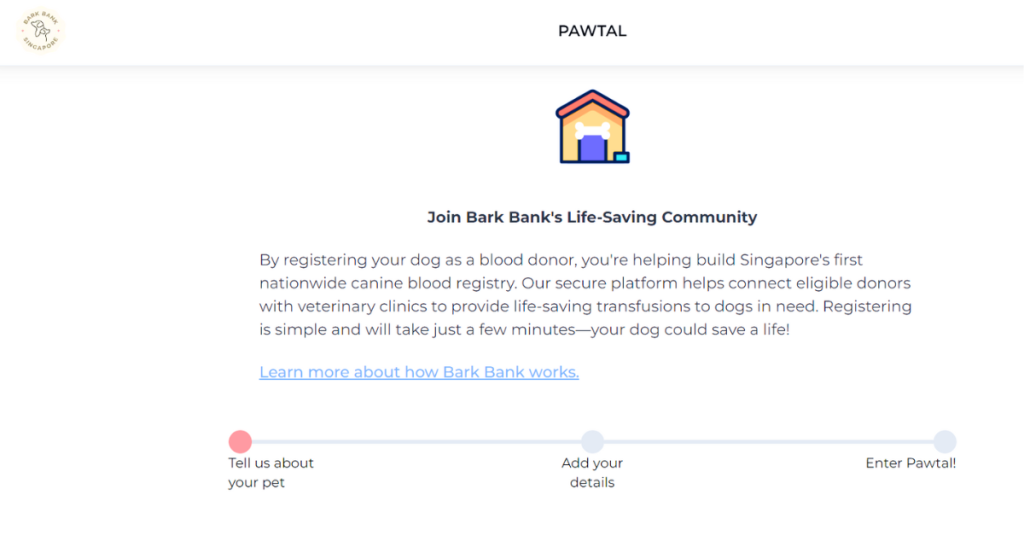
The team decided against building a mobile app, believing that during stressful times when dog owners are urgently seeking blood, downloading an app wouldn’t be their priority.
Similarly, for vets, introducing an entirely new platform—and expecting them to download an app—could involve significant corporate hurdles.
Basic Profile Management is already live on the online Pawtal, enabling dog owners to create and manage their pet’s profiles, while veterinarians can update basic donation medical reports.
Onto the future
Since launching in late August, Bark Bank has been building a small but growing base of eligible donor dogs. The team is now looking for their first veterinary partner to expand their impact.
As a new initiative, the team is still in the early stages of building their metrics. So far, they’re looking at indicators such as the number of registered donor dogs and partner vet clinics as markers of growth and impact. Of course, they’ll also be paying attention to the successful facilitation of blood donations.
For now, Bark Bank’s immediate ambition is to register at least 100 eligible donor dogs while continuing to build its network of veterinary clinics.
In the long term, they aim to develop a donor-recipient matching system to ensure dogs in need receive compatible blood transfusions quickly.

“Both enhanced Profile Management features and the Donor Matching System are in our development pipeline, with plans to launch by 2025,” they said.
A continual hurdle they expect to face, though, is awareness.
“Canine blood donation is not widely discussed in the pet community, and many dog owners are unaware of the need,” the co-founders pointed out. “We also face logistical challenges in connecting donors with vets, as it requires coordination and trust.”
So, rather than jumping ahead with expansion plans, the team is focused on building up the foundational basics of their system.
“For now, we are single-minded in our focus, aiming to facilitate the connection between dogs in need and medical assistance as efficiently and respectfully as possible,” they said. “Any future expansion efforts will align with this goal, rather than expanding for the sake of it.”
Also Read: 5 scenarios in which you would appreciate having the reliable ASUS Vivobook 16 for work
Featured Image Credit: Bark Bank
Feeling disconnected with his corporate job, this S’porean left to start a nasi lemak stall
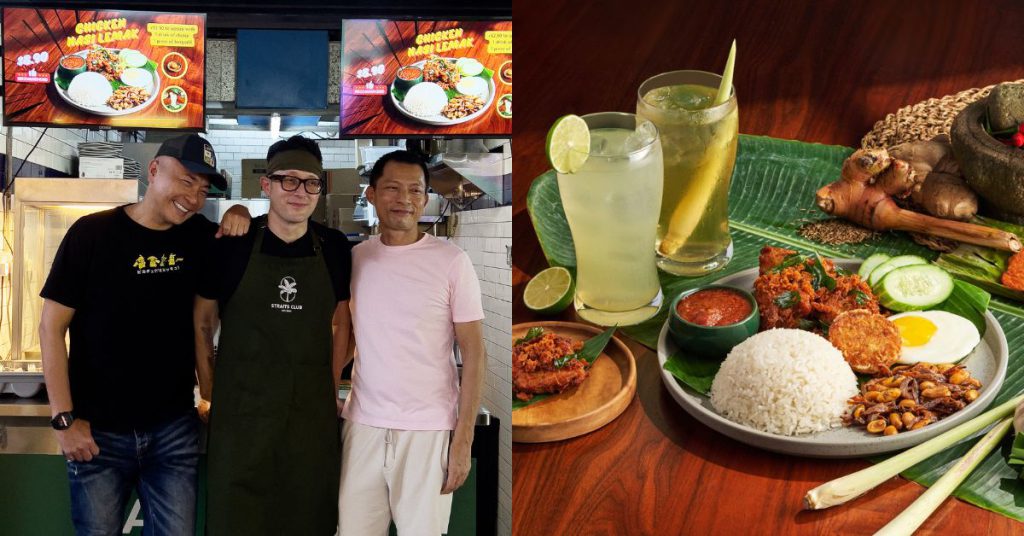
If you walk along a container food park at Timbre+ One-North, Singapore, don’t be surprised if you spot veteran local celebrities Tay Ping Hui and Ix Shen casually hanging around a nasi lemak stall.
That’s because this isn’t just any food stall—it’s Straits Club, founded by their long-time friend James Ong and his wife.
This venture is a heartfelt mission to preserve Singapore’s local food culture with the trio’s deep-rooted friendship.
The power of friendship
The trio first met in the 1990s and quickly bonded over shared interests. Tay and Ix have been pillars of support for James throughout his journey.
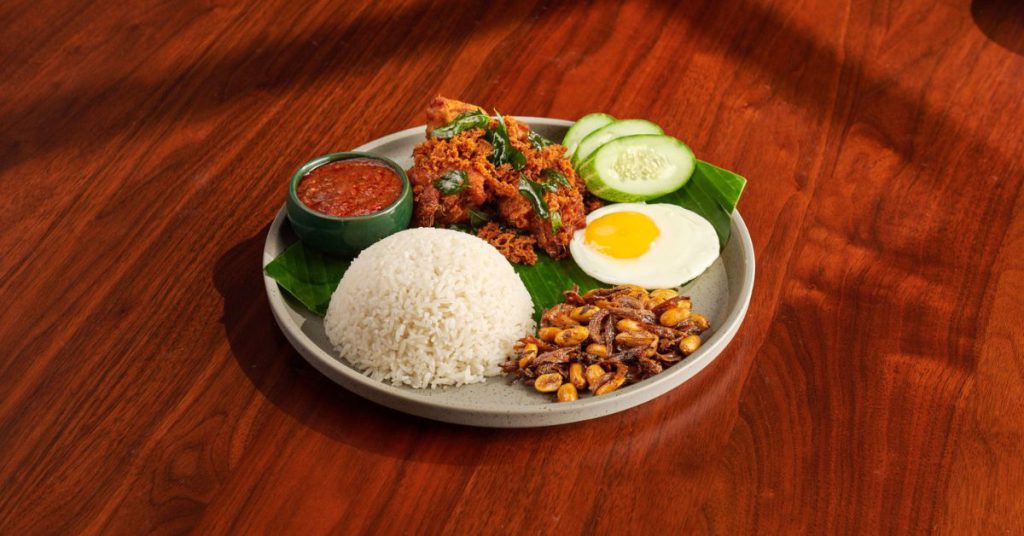
“They’ve been with me from the beginning,” James shared. “We met over 30 years ago as models on the job, and they’ve been like family ever since.”
They offered valuable feedback during the R&D process for Straits Club, provided moral support during tough times, and shared the joy of seeing the venture come to life earlier this year.
Their support highlights a key aspect of Straits Club’s brand—community. For James, it’s not just about serving food; it’s about creating a meaningful experience for both customers and the people behind the scenes.
From corporate desk to hawker stall
Before Straits Club, James had a successful corporate career in IT transformation and client solutions, but he felt an increasing disconnect between his job and what truly made him happy.
“I found myself yearning for something more hands-on,” James recalled. “The idea for Straits Club had been brewing for some time.”
Cooking had always been a passion for James. His love for hosting family and friends naturally translated into the idea of running a nasi lemak stall. But more than personal ambition, James was driven by a growing concern for the fading heritage of Singaporean food.
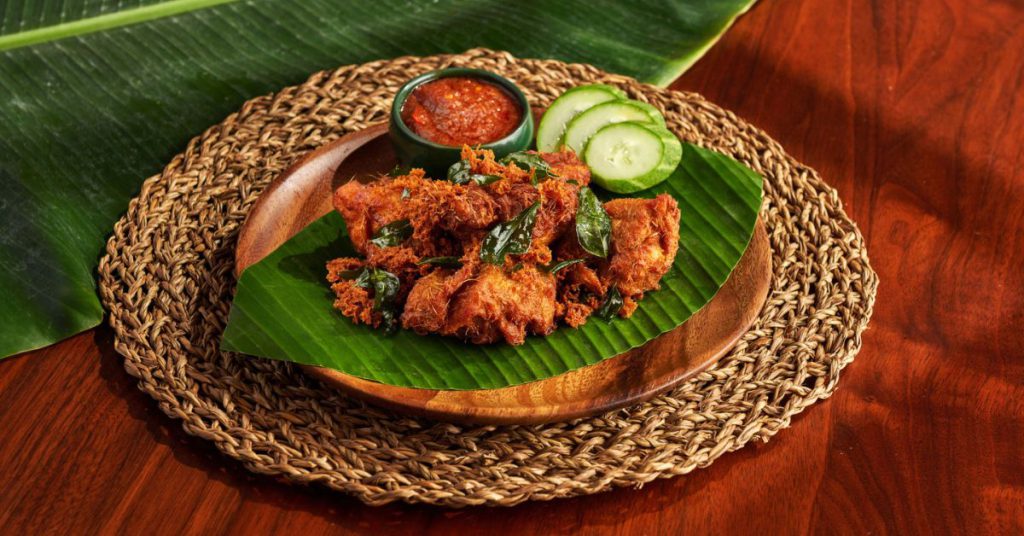
“It’s a key part of our identity,” he told Vulcan Post. Preserving this cultural heritage for future generations became a mission for him.
Crafting the perfect dish
Choosing to sell nasi lemak was as personal as it was practical for James. Nasi lemak had always been a go-to supper for him and his close friends, a dish that sparked late-night conversations and brought people together.
“Food has always been a significant part of our friendship,” James shared, remembering those nostalgic moments shared over plates of this iconic dish with his friends.
Inspired by this personal history, James wanted to create his version of nasi lemak—one that preserved traditional flavours while adding a modern twist.
And his experience at Village Park, a nasi lemak shop in Malaysia, cemented this vision. “Their berempah (a Malay term to say coated with spices) fried chicken was mind-blowing, and the texture and spices left a lasting impact on me. That feeling is something I want to replicate for my customers,” he recalled.
Unlike the usual fried chicken, Straits Club’s berempah fried chicken is a labour of love. “We use a blend of 10 different spices,” James explained, “And it’s highly sensitive to heat, requiring considerable skill.”

Getting the balance just right is tricky, but it’s this attention to detail that sets Straits Club apart from its competitors.
And it’s not just the chicken. Every element of the dish, from the freshly prepared pandan coconut rice to the spice mix, is crafted with care, he said.
James refuses to compromise on quality. “We change our oil daily to keep our chicken fresh, and our recipe uses less salt. Even our drinks are lower in sugar, so people can enjoy good food without sacrificing their health,” he added.
But achieving this balance wasn’t easy. Menu development took about eight months of trial and error, refining recipes with the help of friends, customers, and personal taste tests.
“The most challenging part was scaling up without losing quality,” James admitted. “But the end result was worth it.”
Building a business from the ground up
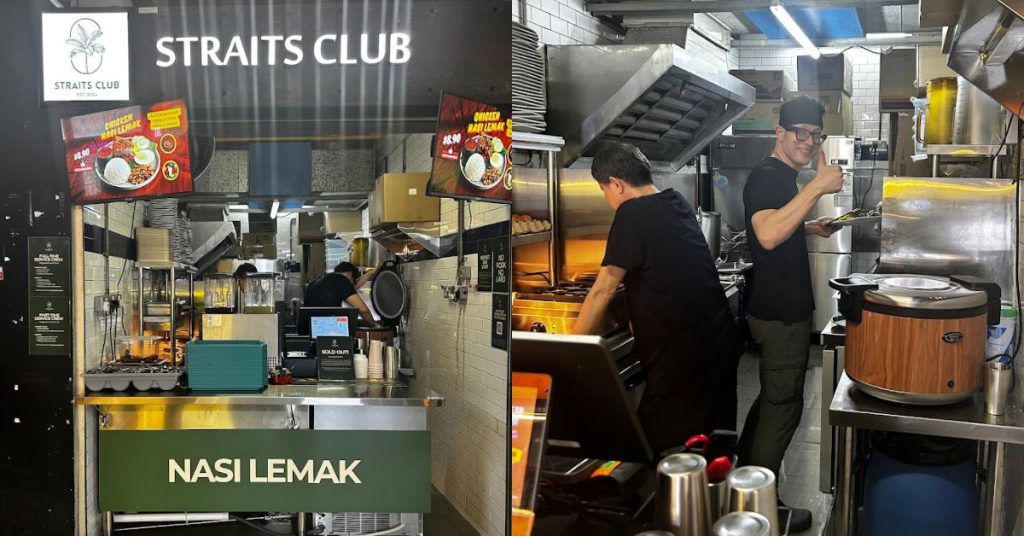
Transitioning from a corporate desk job to the physical demands of running an F&B business was no small feat. “It’s a major adjustment,” James said with a smile. “The physical strain is intense compared to office work.”
To cope, he’s incorporated boxing and gym sessions into his routine, not only to build physical stamina but also to stay mentally sharp.
This shift also came with practical challenges. James quickly realised that scaling up would require operational efficiency and strategic sourcing.
“We work closely with suppliers to secure the best deals without compromising on quality,” he explained.
By streamlining processes, Straits Club manages to keep costs in check while maintaining high standards, all while offering a reasonable price point for customers.
Throughout his journey, James has learnt that adaptability is key. “No matter how well you plan, things can go wrong—whether it’s equipment breaking down or ingredient shortages,” he explains. “Being able to adapt quickly is essential.”
Equally important is listening to customer feedback. “It’s about striking a balance,” he said.
“You can’t please everyone, but you have to remain flexible enough to adapt when necessary.” At the end of the day, James trusts his instincts and stays true to the brand’s vision.

The next chapter
James and his wife are already looking ahead. “Straits Club is definitely a long-term commitment for us,” he said confidently.
“We’re in it for the long haul, and I don’t see myself stepping away any time soon.”
Their goal is to expand Straits Club into a chain, and they’ve already started laying the groundwork.
Detailed Standard Operating Procedures (SOPs) ensure consistency as they scale up, and plans for new dishes, like Malay satay and laksa, are in the works.
The team is also looking into bulk corporate orders and island-wide delivery to make their food more accessible.
“We want to show our kids that there are many paths to success,” James said. For him and his wife, Straits Club isn’t just a business—it’s a retirement plan, a legacy, and an opportunity to inspire future generations.
From reconnecting with his passion for cooking to building a brand that preserves Singapore’s local food culture, James Ong has poured his heart into Straits Club.
As Straits Club continues to grow, one thing is clear: James is in it for the long haul. And with every plate of nasi lemak served, he’s not just feeding his customers—he’s feeding his dreams.
- You can learn more about Straits Club here.
- Read other articles we’ve written about Singaporean startups here.
Also Read: A ClassPass competitor? This new app lets you access nearly 300 fitness studios in M’sia.
Featured Image Credit: Straits Club
